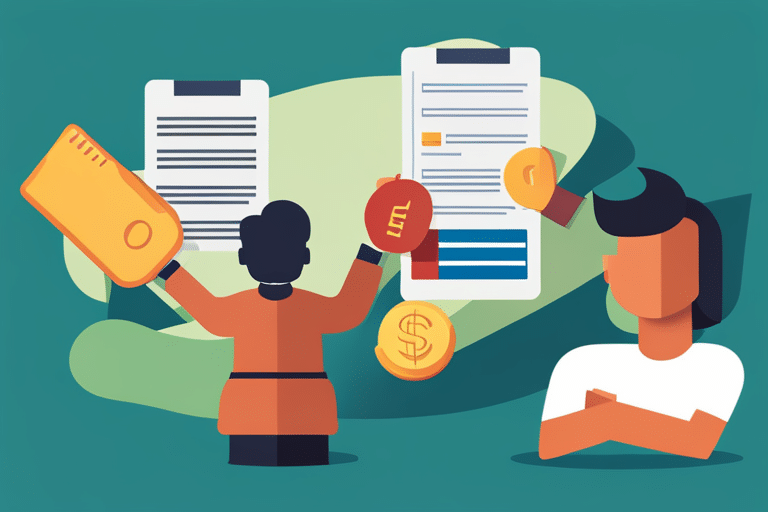Are you tired of feeling like a pawn in the credit score game? It’s time to break free from the chains of common misconceptions and take control of your financial fate.
In this article, we’re going to debunk those credit score myths that have been holding you back. Prepare to be enlightened as we shed light on the truth behind closing credit cards, checking your score regularly, paying off debt, multiple inquiries, and more.
Get ready for a journey towards credit mastery!
Key Takeaways
- Closing credit cards does not necessarily hurt your credit utilization ratio or reduce your available credit.
- Checking your credit score regularly does not negatively impact your credit score.
- Being debt-free does not automatically boost your credit score.
- Multiple credit inquiries do not always cause a significant drop in your credit score.
The Myth of Closing Credit Cards to Improve Your Score

If you think closing credit cards will boost your score, you’re mistaken. It’s like thinking eating a whole pizza will make you lose weight. Trust me, I’ve tried it. But let me break it down for you in a way that even your grandma would understand.
Closing credit cards actually hurts your credit utilization ratio. Yeah, I know, big words. Credit utilization is just a fancy way of saying how much of your available credit you’re using. The lower the better! When you close a credit card, that available credit disappears faster than my motivation to go to the gym on a Monday morning.
Now let’s talk about the impact of credit age. No, we’re not talking about how old your credit actually looks (although mine could definitely use some anti-aging cream). Credit age refers to how long you’ve had your accounts open and active. Closing an old card can shorten your average account age faster than Usain Bolt running from commitment.
So what should you do instead? Keep those cards open! Just don’t go on crazy spending sprees like there’s no tomorrow. Use them responsibly and pay off those balances like a boss.
And speaking of being responsible, let’s talk about the truth about checking your credit score regularly…
The Truth About Checking Your Credit Score Regularly

Alright, let’s talk about checking your credit score regularly. You may be wondering, does it really make a difference?
Well, buckle up because we’re about to dive into the thrilling world of Credit Score Frequency Impact, Score Accuracy Overtime, and the age-old question: Should you be checking your credit score as often as you check your Instagram feed?
Get ready for some eye-opening insights!
Credit Score Frequency Impact
The frequency of your credit score impacts your overall creditworthiness. It’s like a dance, you see. The more often you check your credit score, the better you can stay on top of things and make moves to improve it. But beware! Checking too frequently can also be seen as desperate, like constantly asking someone out on a date. So find that sweet spot where you’re proactive but not obsessive.
To truly understand how often to check your credit score, let’s break it down in a nifty little table:
| Credit Score Calculation | Credit Score Factors |
|---|---|
| Payment history | Amount owed |
| Length of credit | New credit |
| Types of credit used |
Keep in mind that these factors are just the tip of the iceberg when it comes to calculating your credit score. So get out there and boogie responsibly with your financial future!
Score Accuracy Overtime
Remember to regularly check your credit score for accuracy over time and ensure that all the information on it is up-to-date. I mean, who knows what kind of shenanigans can happen behind the scenes? Maybe a rogue cat got hold of your credit card and went on a shopping spree! Or perhaps an evil twin with terrible money management skills decided to use your identity for some late-night spending. Either way, keeping tabs on your credit score is like being the detective in your own financial mystery novel.
Late payments have about as much impact on your credit score as eating a whole tub of ice cream has on your waistline – not good, my friend! So make sure you pay those bills on time and avoid any unpleasant surprises when it comes to your creditworthiness.
Credit utilization, aka how much of your available credit you’re using, is another sneaky little critter that can mess with your score. It’s like trying to fit into those skinny jeans after Thanksgiving dinner – too much can be a bad thing. So keep an eye on those balances and try not to max out all of your cards at once.
Checking Credit Score Frequently?
When it comes to checking your credit score frequently, you’ll want to make sure you’re utilizing a reliable and secure platform. After all, we live in an age where even your toaster can be hacked (don’t worry, yours is safe…for now). But I digress.
Let’s talk about the impact of credit utilization and the benefits of credit monitoring.
Credit utilization refers to how much of your available credit you’re using. It’s like trying to fit into those skinny jeans after Thanksgiving dinner – not a good look. High credit utilization can negatively affect your score, so it’s important to keep it low.
That’s where credit monitoring comes in handy. It allows you to keep tabs on your credit score and any changes that may occur. Think of it as having a personal assistant who whispers sweet nothings in your ear whenever something fishy happens with your credit.
Debunking the Idea That Paying Off All Debt Boosts Your Score

So, you think that paying off all your debt will automatically skyrocket your credit score? Well, hold onto your wallet and take a seat, my friend.
Because here’s the truth: being debt-free doesn’t necessarily mean a higher score. Your credit mix matters too! Plus, did you know that the timing of your payments can also affect how lenders see you? It’s like trying to impress someone with a perfectly timed joke – it can make all the difference.
Let’s delve into these credit score secrets and uncover the truth together!
Debt-Free ≠ Higher Score
Paying off all your debts doesn’t necessarily mean your credit score will be higher. I know, it sounds like a cruel joke, right? You’ve worked so hard to eliminate those pesky balances, only to find out that it might not make a dent in your credit score.
Well, let me explain why.
One of the factors affecting your credit score is something called credit utilization. This fancy term refers to how much of your available credit you’re using at any given time. So even if you pay off all your debts, if you still have high balances on other accounts or maxed-out credit cards, your credit utilization ratio could still be high. And unfortunately, that can negatively impact your precious score.
Credit Mix Matters
Alright, buckle up, because we’re about to dive into the wacky world of credit mix! Now, you might be thinking, ‘Why should I care about the types of credit accounts I have?’ Well my friend, let me tell you why it matters.
Having a good credit mix is like having a well-balanced meal. You don’t want to fill your plate with just one type of food because that’s boring and not very nutritious. Similarly, having a variety of credit accounts can boost your credit score and show lenders that you can handle different types of debt responsibly.
So what are these magical types of credit accounts? We’re talking about things like credit cards, mortgages, car loans, student loans – the whole shebang! The key here is to have a healthy mix without going overboard. Too much debt can be overwhelming and leave you feeling like a hamster on a wheel.
Timing of Payments
Don’t forget, staying on top of your payment timing is crucial for maintaining a healthy credit profile. So, let’s dive into the world of credit score calculation and explore the importance of paying your bills on time. Here are four reasons why timing is everything:
-
Avoid Late Payment Penalties: Paying late can lead to hefty fees and penalties. Who wants to waste money on unnecessary charges? Not you!
-
Maintain a Low Credit Utilization Ratio: By paying your bills on time, you keep your credit utilization low. A high utilization ratio can negatively impact your credit score, so let’s avoid that.
-
Build Trust with Lenders: Consistent, timely payments show lenders that you’re reliable and trustworthy. This helps build a positive relationship and increases the likelihood of future approval for loans or credit cards.
-
Boost Your Credit Score: Timely payments contribute to a higher credit score overall. It demonstrates responsible financial management and makes you look like an absolute rockstar in the eyes of creditors.
Now that we’ve covered the importance of payment timing, let’s move on to another myth surrounding multiple credit inquiries and their impact on your score…
The Reality of Multiple Credit Inquiries on Your Score

Having multiple credit inquiries on your score doesn’t necessarily mean it will plummet. In fact, it’s time to debunk another common credit score myth! So grab a snack, sit back, and let’s dive into the reality of multiple credit inquiries.
Now, you may have heard that every time you apply for credit—whether it’s a new credit card or a loan—your precious score takes a hit. But fear not, my friend! While it’s true that each inquiry can have some impact, the effect is often exaggerated. It’s like when you accidentally eat three slices of pizza instead of one; sure, your stomach might protest a little, but it won’t ruin your entire diet.
So how does this all work? Well, when calculating your credit score, various factors come into play. Credit utilization—the amount of available credit you actually use—is important. But guess what? Multiple inquiries don’t directly affect your utilization rate. It’s like having extra cheese on your pizza—it doesn’t change the total number of slices!
Another aspect to consider is the role of credit history length. Yes, having a longer credit history can be beneficial for your score. But here’s the thing: those pesky inquiries only stay on your report for about two years (kinda like that leftover slice in the fridge). So unless you’re constantly applying for new lines of credit every week (which I hope you’re not), their impact will fade away with time.
Dispelling the Myth of Good Credit Only Coming From Credit Cards

If you’ve always believed that good credit can only come from using credit cards, it’s time to think again. Contrary to popular belief, there are actually other ways to build a solid credit score without relying solely on those shiny plastic rectangles. So put down your wallet and get ready to explore some alternative credit sources that will have you saying goodbye to those pesky interest rates and hello to a brighter financial future!
-
Rent Payments: Did you know that your monthly rent could actually help boost your credit? That’s right, by signing up for a service like RentReporters, you can have your on-time rent payments reported to the credit bureaus. Finally, all those years of paying rent on time will count for something more than just keeping a roof over your head.
-
Utility Bills: Who knew that paying your electricity bill could be so rewarding? Some utility companies now offer programs where they report your payment history to the credit bureaus. So go ahead and keep the lights on – it’ll be helping your credit score shine too.
-
Cell Phone Bills: Your trusty phone companion can do more than just keep you connected. By making timely payments on your cell phone bill, you can show lenders that you’re responsible with your finances. Plus, who doesn’t love getting rewarded for all those hours spent scrolling through cat videos?
-
Personal Loans: Need some extra cash but don’t want to rely on a high-interest rate credit card? Consider taking out a personal loan instead! Not only will this give you the funds you need, but making regular payments towards the loan will also demonstrate good financial habits.
Understanding the Impact of Income on Your Credit Score

You might be surprised to learn just how much your income can affect your credit score. Yes, you heard it right! Your hard-earned cashola has the power to influence those three little digits that determine your financial reputation. But before we delve into the nitty-gritty, let’s have a little fun with a table, shall we?
| Income Level | Credit Score Impact |
|---|---|
| Broke as a joke | 0 |
| Living on Ramen | -50 |
| Ballin’ on a budget | +25 |
| Swimmin’ in dough | +100 |
Now that we’ve got that out of the way, let’s get down to business. The correlation between your credit score and employment status is real, my friend. Lenders like stability and consistency, so if you’re hopping from job to job like a kangaroo on caffeine, it could negatively impact your creditworthiness. On the other hand, having a steady income shows reliability and increases your chances of getting approved for loans or credit cards.
But wait, there’s more! Your income doesn’t just affect lenders’ perception of you; it also plays a role in another crucial factor: credit utilization. Credit utilization refers to how much of your available credit you’re using at any given time. And guess what? People with higher incomes tend to have lower credit utilization ratios because they can afford to pay off their balances in full each month. So not only does money make the world go round, but it also helps keep your credit score looking mighty fine.
Frequently Asked Questions
Can Opening New Credit Cards Help Improve Your Credit Score?
Opening new credit cards can help improve your credit score, but it’s not a magic cure-all. Pros: more available credit. Cons: potential for overspending. High utilization hurts scores, so don’t go crazy with those shiny plastic temptations!
Is It True That Checking Your Credit Score Regularly Can Negatively Impact Your Score?
Don’t worry, checking your credit score regularly won’t harm it! In fact, staying on top of your score can help you catch errors and address issues. So keep checking and stay in control!
Does Paying off All Your Debt Automatically Guarantee a Boost in Your Credit Score?
Paying off all your debt doesn’t magically boost your credit score. It’s like expecting a standing ovation after doing the dishes. Keep an eye on other factors like payment history and credit utilization too!
How Much Do Multiple Credit Inquiries Affect Your Credit Score?
Hey, savvy spender! Wondering how much those credit inquiries impact your score? Well, multiple inquiries can have a noticeable effect. So keep an eye on your credit utilization and remember, history matters too!
Can Having a High Income Significantly Improve Your Credit Score?
Having a high income alone won’t significantly improve your credit score. It’s important to manage your credit utilization and avoid late payments, which have a bigger impact. Money can’t buy you everything!
Conclusion
Congratulations! You’ve made it to the end of this myth-busting credit score journey.
It’s been a wild ride, but now you can confidently navigate the treacherous waters of credit scores armed with the truth.
Remember, closing credit cards won’t magically boost your score, and checking it regularly won’t summon any lurking monsters.
Paying off all your debt won’t make you an instant superhero, and multiple inquiries won’t turn you into a social pariah.
And hey, good credit doesn’t only come from those fancy plastic rectangles!
So go forth, armed with knowledge and a smile, as you conquer the credit score game like a true champion!

